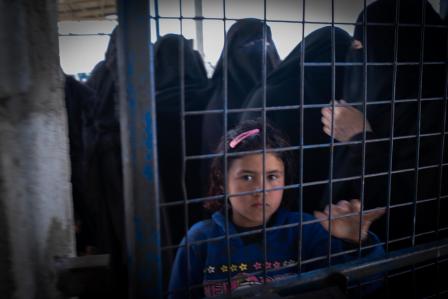Northern Syria: Health system overwhelmed in most severe COVID-19 outbreak yet
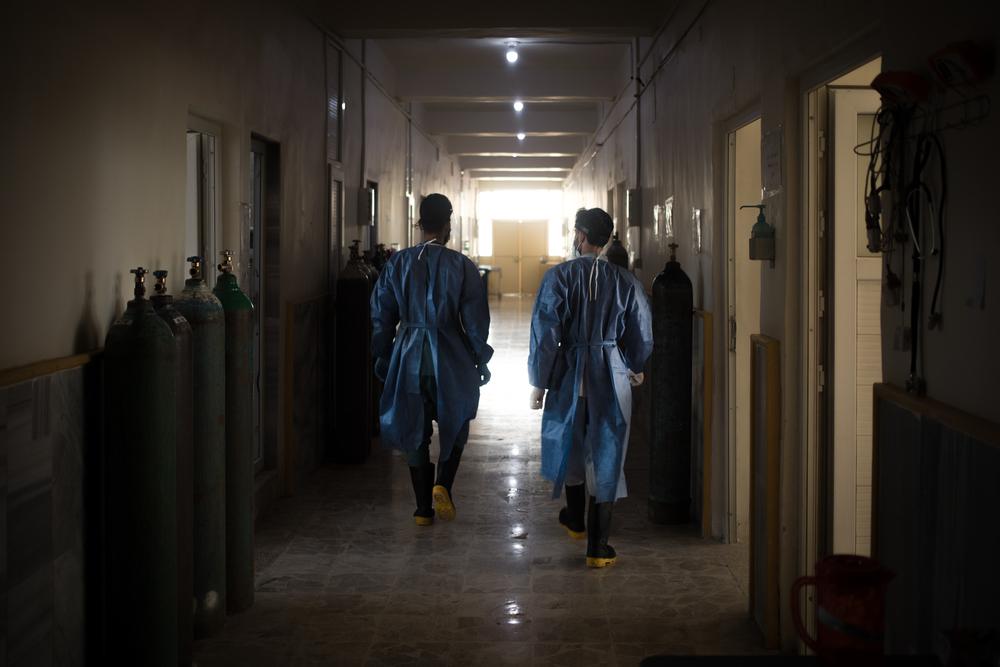
Two nurses walk in the corridors of the specialised COVID-19 ward, in the Raqqa National hospital. Doctors Without Borders has now moved its COVID-19 response from Raqqa National Hospital to Raqqa COVID-19 centre. June 2021. © Florent Vergnes
Northern Syria - October 13th, 2021 - Northern Syria is experiencing its most severe recorded wave of COVID-19 yet, with needs fast outpacing limited oxygen supplies and health facilities running out of testing kits. In the northwest the health system is already unable to cope, while in the northeast the virus is spreading at a worrying pace, the international medical humanitarian organisation Doctors Without Borders/Médecins Sans Frontières (MSF) said today.
In northwest Syria, the number of confirmed cases of COVID-19 almost doubled in September, reaching nearly 73,000 compared to the 39,000 cases recorded by the end of August. “The peak reached in this wave so far has been as high as 1,500 cases per day, while it never exceeded 600 cases per day during previous waves,” said Francisco Otero y Villar, Doctors Without Borders Head of Mission for Syria. Only 16 COVID-19 treatment centres out of 33 are currently functioning in this region of four million people. An already limited health infrastructure, as well as supply issues resulting in inadequate screening, make it impossible to both assess the real extent of the spread of the virus and offer an adequate response. Efforts to contain the virus are hindered by poor access to healthcare and the low immunisation rate in the northwest, where only 3% of the total population is fully vaccinated owing to people’s hesitancy to take the vaccine and a slow vaccine rollout.
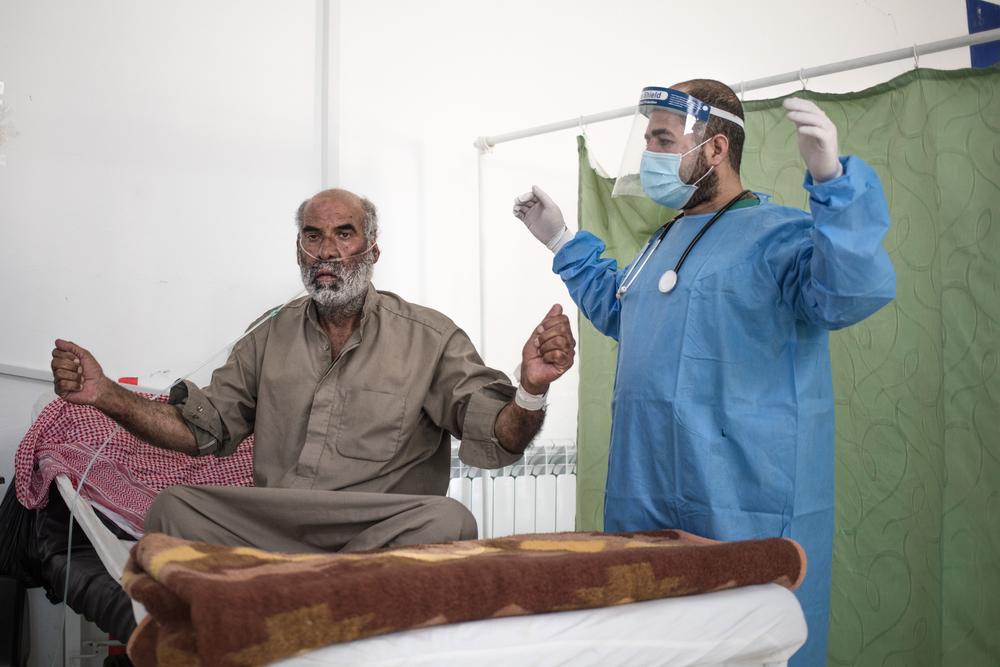
Abdul Harma, head nurse at the hospital specialising in COVID-19 in Hassakeh, in northeast Syria, treats Mr. Ali with breathing exercises.
At 65, Ali believed he was going to die when the first symptoms got worse: “At first, I thought it was the flu, as usual this season, then it got worse. When I was struggling to breathe my wife forced me to go to the hospital. I was told it was COVID-19, I panicked, I thought it was the end. I couldn't talk so much anymore that I was short of breath. But thank God and the whole hospital team, things are much better!"
June, 2021 © Florent Vergnes
We are directly witnessing the extent of this outbreak in the facilities we manage and support: people in desperate need of oxygen or intensive care are stuck in queues, because no beds or ventilators are available, which is leading to a higher mortality rate compared with previous waves. In Afrin, 44% of the patients currently admitted to a centre supported by Doctors Without Borders are between 16 and 40 years old, indicating that even people who were previously thought to be relatively safe from severe illness caused by the virus are being seriously impacted.Head of Mission Francisco Otero y Villar
Doctors Without Borders is trying to scale up its operations based on these increasing needs. In August, we reopened two COVID-19 isolation centers in Idlib governorate, and we are now in the process of expanding their capacity. We also renewed our support to two Community Treatment Centres in Afrin and Al-Bab and we continue to support a treatment centre for respiratory illnesses in Afrin. In displacement camps, where more than 13% of the total confirmed cases are living, we run mobile clinics to conduct COVID-19 tests and distribute prevention kits for displaced people.
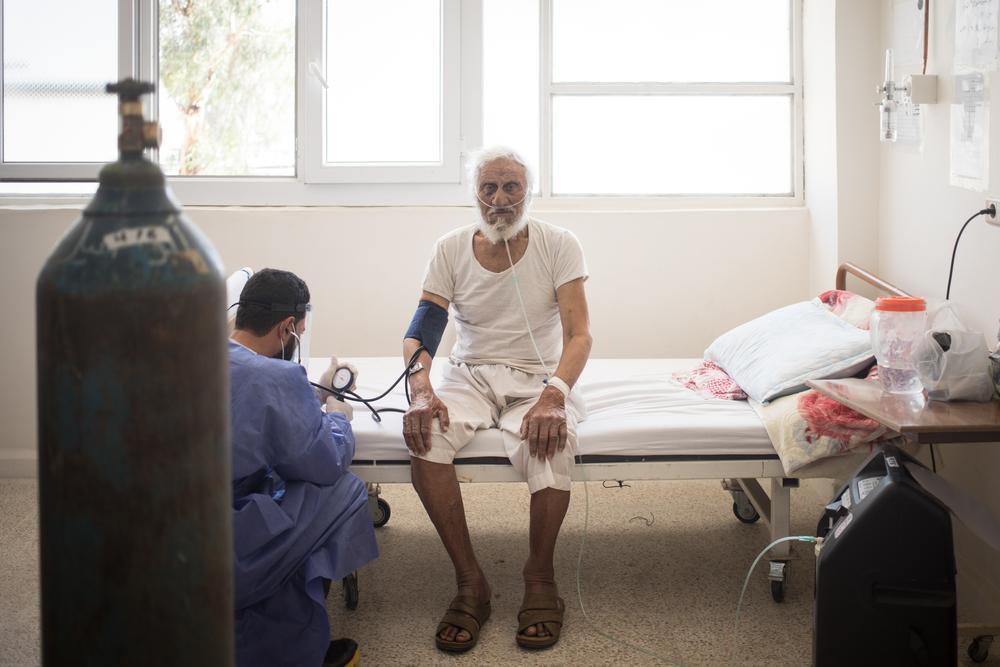
In Raqqa National hospital, Abu Bakr, in his sixties, felt the first symptoms of COVID-19 a week before being hospitalised.
“I went to see the pharmacist in my village. He gave me antibiotics. It didn't help, it got worse. So I paid for the taxi to go see a doctor in town. When I was told it was COVID-19, I thought it was over for me. Now, thank God and the nurses, it's much better, I can even talk.” June, 2021 © Florent Vergnes
Doctors Without Borders has also witnessed a worrying increase of COVID-19 cases in northeast Syria over the past few weeks. In the last week of September, an average of 342 people tested positive each day: the highest daily number since the pandemic began. While numbers had started to decrease in the first week of October, the only laboratory able to perform PCR tests to diagnose COVID-19 in the region is running short on materials and faces the possibility of halting all testing in the coming weeks if numbers do not continue to decline. The supply of oxygen is also under serious strain, with the COVID-19 treatment facility in Hassakeh forced to source oxygen cylinders from Qamishli, Raqqa and Tabqa cities in order to meet demand.
In response to this new COVID-19 wave, Doctors Without Borders is partnering with a local organisation to care for people with suspected or confirmed COVID-19 in treatment centres in Hassakeh and Raqqa city. But our ability to source oxygen is stretched, and we are worried that if the number of positive cases increase again, or stays steady at such high rates, we will be unable to meet the demands for all patients.Hanna Majanen, emergency medical manager
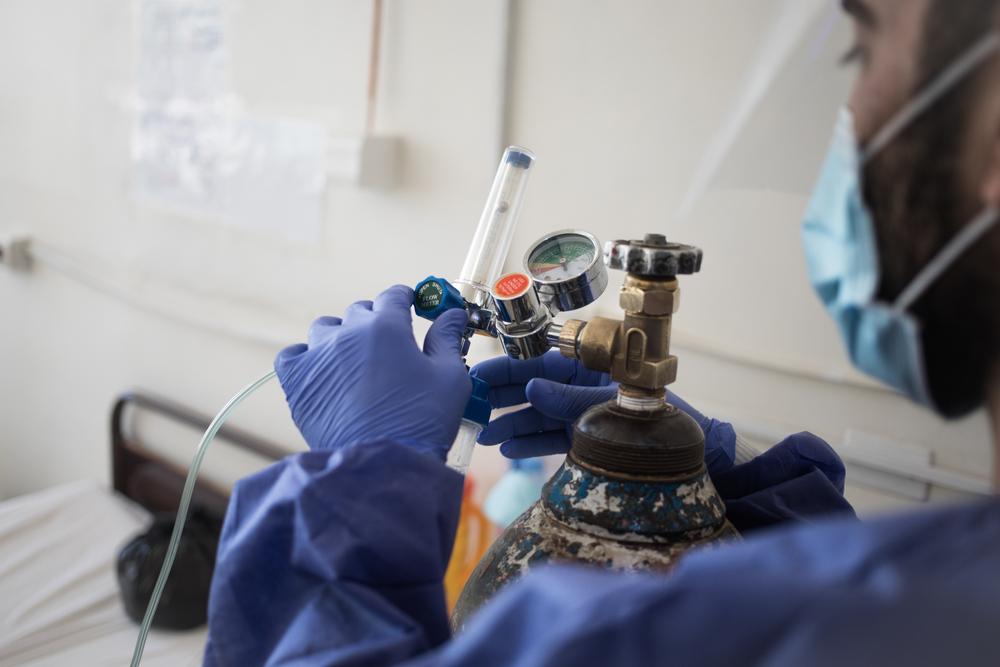
A nurse checks the pressure of a patient’s oxygen canister in the COVID-19 section of Raqqa National Hospital, in northeast Syria. "We are afraid of a shortage," he says. June 2021. © Florent Vergnes
Even prior to the pandemic, the health system in northern Syria was already struggling and reliant on humanitarian aid to respond to medical needs. Now, healthcare facilities and humanitarian actors alike are unable to cope with the extent of this new wave. Today more than ever, efforts must be made to save these facilities from totally collapsing under the weight of the pandemic. Support and protection for healthcare workers, provision of testing kits and oxygen, increased beds capacity in hospitals and the expansion of vaccination coverage are urgently needed to save the lives of the many COVID-19 patients, and to keep the health system functioning in northern Syria.
